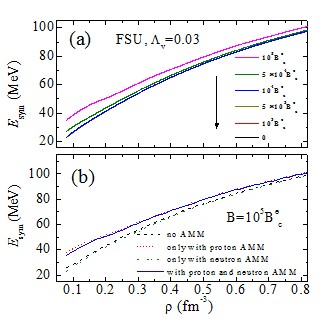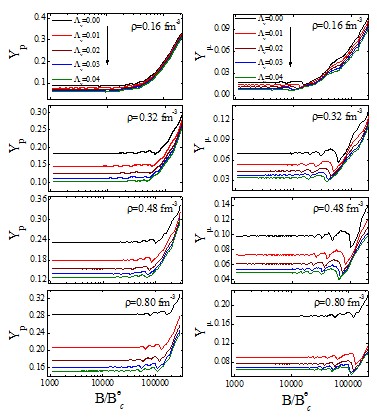The nuclear matter and its symmetry energy play a crucial role in understanding a variety of issues in nuclear physics as well as astrophysics, such as the neutron star structure and properties. The magnetic field in the neutron stars could be very strong. In addition, the strong magnetic fields are also created in heavy-ion collisions. Therefore, much attention has been paid to the properties of the dense matter in strong magnetic fields.
Researchers in the Theoretical Physics Group at Institute of Modern Physics, Chinese Academy of Sciences (IMP) investigated the properties of dense matter in the presence of strong magnetic fields, including the density-dependent symmetry energy, the chemical composition and spin polarizations in the framework of the FSUGold interactions including the anomalous magnetic moments.
Researchers found that the parabolic isospin dependence of the energy per nucleon of asymmetric nuclear matter remains valid for the values of magnetic field below 105Bec (Bec=4.414 × 1013 G). The symmetry energy is enhanced by the presence of the magnetic field, in particular at low densities. The fractions of components rely on both the symmetry energy and the strong magnetic fields. In addition, the density-dependent symmetry energy affects the proton polarization but it has almost no effect on neutron polarization. And the proton (neutron) anomalous magnetic moment affects the spin polarizations of the proton (neutron) obviously.
The results have been published in Nucl. Phys. A 898 (2013) 32.
The article can be linked as follows:http://www.sciencedirect.com/science/article/pii/S0375947412003223

Fig.1 Density dependence of the nuclear symmetry energy for different magnetic field strengths. (Image by IMP)

Fig.2 Proton and muon fractions in β-stable matter versus the magnetic field strength
under different symmetry energy from the stiff one to the soft one. (Image by IMP)

